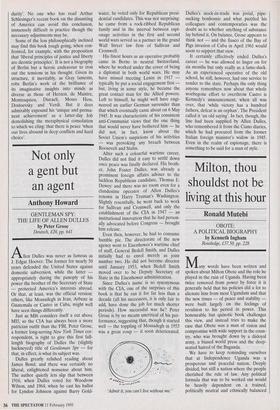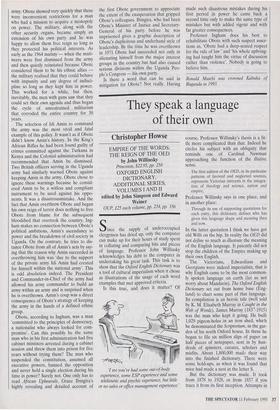Milton, thou shouldst not be living at this hour
Ronald Mutebi
OBOTE: A POLITICAL BIOGRAPHY by Kenneth Ingham Routledge, f37.50, pp. 228 M any words have been written and spoken about Milton Obotc and the role he played in the ruin of Uganda. Having been twice removed from power by force it is generally held that his policies did a lot to alienate him from most Ugandans and that the new times — of peace and stability were built largely on the feelings of revulsion to his period in power. This honourable but quixotic book challenges this view, and instead tries to make the case that Obote was a man of vision and compromise with wide support in the coun- try, who was brought down by a disloyal army, a biased world press and the deep- seated hatred of the Baganda, We have to keep reminding ourselves that at Independence Uganda was a prosperous and peaceful nation. Deeply divided, but still a nation where the people cherished the rule of law. Any political formula that was to be worked out would be heavily dependent on a trained, politically neutral and ethnically balanced army. Obote showed very quickly that these were inconvenient restrictions for a man who had a mission to acquire a monopoly on power. The military, along with the other security organs, became simply an extension of his own party and he was happy to allow them free reign so long as they protected his political interests. As early as the 1964 mutiny — when the muti- neers were first dismissed from the army and then quietly reinstated because Obote considered them to be his ethnic allies the military realised that they could behave with impunity and any degree of indisci- pline so long as they kept him in power. This worked for a while, but then, inevitably, the men with guns saw that they could set their own agenda and thus began the cycle of unrestrained militarism that corroded the entire country for 30 years.
The selection of Idi Amin to command the army was the most vivid and fatal example of this policy. It wasn't as if Obote didn't know Amin's history. In the King's African Rifles he had been found guilty of crimes committed against the Turkana in Kenya and the Colonial administration had recommended that Amin be dismissed. Two British officers serving in the Uganda army had similarly warned Obote against keeping Amin in the army. Obote chose to ignore these warnings because he consid- ered Amin to be a witless and compliant instrument to be used against his oppo- nents. It was a disastrousmistake. And the fact that Amin overthrew Obote and began his own reign of terror does nothing to free Obote from blame for the subsequent bloodshed that overtook the country. Ing- ham makes no connection between Obote's political ambitions, Amin's ascendancy to power and the breakdown of civil society in Uganda. On the contrary, he tries to dis- tance Obote from all of Amin's acts by say- ing that the reason why Amin succeeded in overthrowing him was 'due to the support of the private army Idi Amin had created for himself within the national army'. This is odd absolution indeed. The President and Commander-in-Chief of the army had allowed his army commander to build an army within an army and is surprised when he is overthrown. Amin's coup was a direct consequence of Obote's strategy of keeping the army in the hands of a defined ethnic group.
Obote, according to Ingham, was a man `committed to the principles of democracy, a nationalist who always looked for com- promise'. Can this possibly be the same man who in his first administration had five cabinet ministers arrested during a cabinet session and threw them into prison for five years without trying them? The man who suspended the constitution, assumed all executive powers, banned the opposition and never held a single election during his time in power? Surely not. One only has to read African Upheavals, Grace Ibingira's highly revealing and detailed account of the first Obote government to appreciate the extent of the exasperation that gripped Obote's colleagues. Ibingira, who had been Obote's Minister of Justice and Secretary- General of his party before he was imprisoned gives a graphic description of Obote's duplicitous and underhand style of leadership. By the time he was overthrown in 1971 Obote had succeeded not only in alienating himself from the major interest groups in the country but had also caused serious divisions within the Uganda Peo- ple's Congress — his own party. Is there a word that can be said in mitigation for Obote? Not really. Having made such disastrous mistakes during his first period in power he came back a second time only to make the same type of mistakes but with added vigour and with far greater consequences.
Professor Ingham does his best to rehabilitate Obote with such suspect asser- tions as, `Obote had a deep-seated respect for the rule of law' and 'his whole upbring- ing had taught him the virtue of discussion rather than violence'. Nobody is going to believe him.
Ronald Mutebi was crowned Kabaka of Buganda in 1993.



























































 Previous page
Previous page